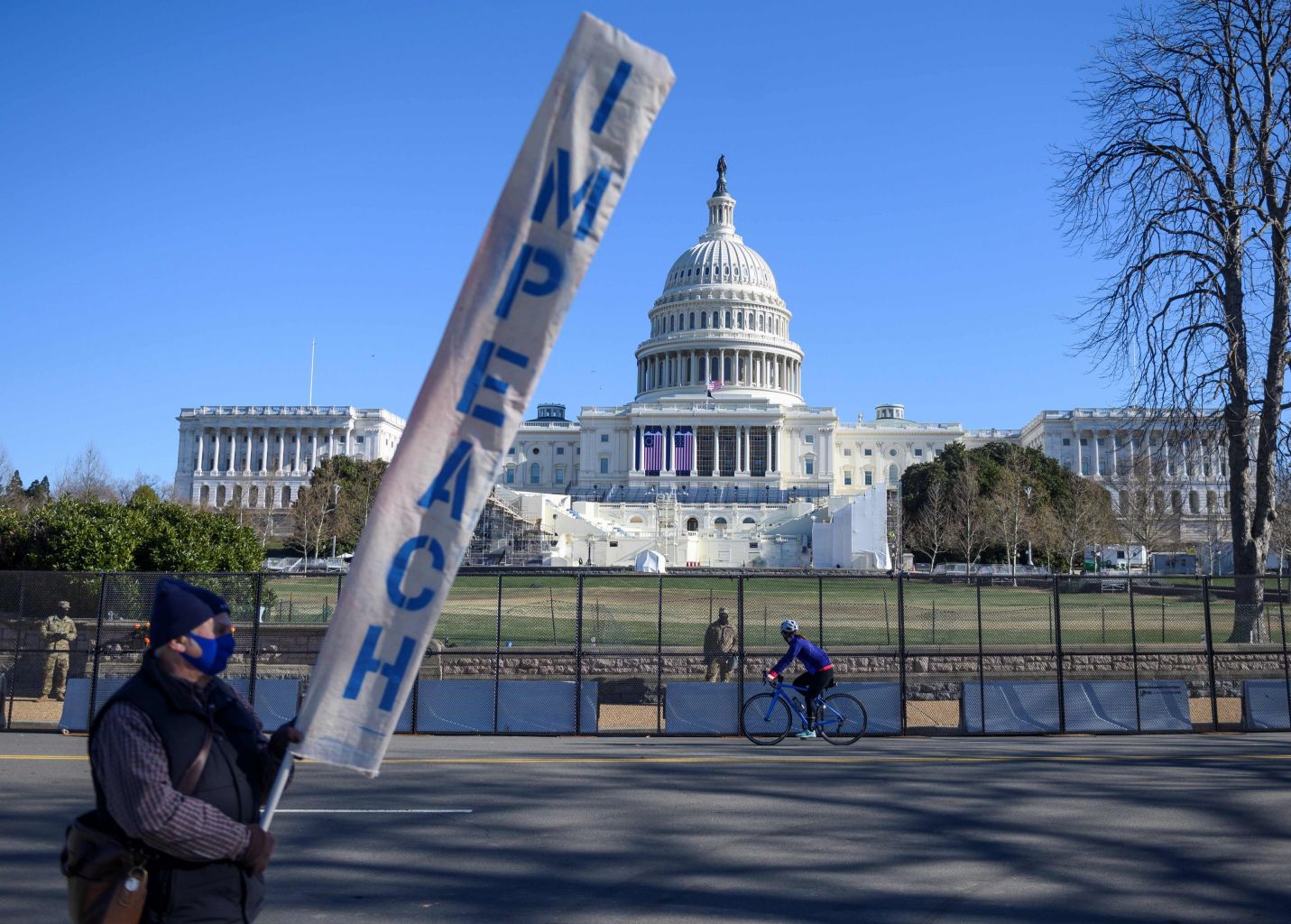US Democrats formally introduce article of impeachment against Trump
Sign up now: Get ST's newsletters delivered to your inbox

A vote on Trump's impeachment could take place as soon as Wednesday.
PHOTO: AFP
Follow topic:
WASHINGTON - House Democrats formally introduced an article of impeachment against President Donald Trump for inciting a mob that attacked the Capitol in a bid to overturn the election results last week, setting up a vote on impeachment on Wednesday (Jan 13) that they have the numbers to win.
The article of impeachment introduced on Monday accuses Mr Trump of "incitement of insurrection", pointing to his false claims that the presidential election had been rigged and how he rallied his supporters to march on the Capitol.
Criticising the impeachment moves by Democratic lawmakers, Mr Trump said: "This impeachment is causing tremendous anger and they're doing it, and it's really a terrible thing that they're doing."
He also said that the move was a continuation of the "witch hunt" against him.
"I want no violence," he told reporters yesterday as he left for a visit to the border wall in Alamo, Texas.
The Democrats also introduced a resolution calling on Vice-President Mike Pence and the Cabinet to act to remove Mr Trump, seeking to pass it by unanimous consent, which Republican lawmakers blocked. That resolution will go to the House for a vote on Tuesday evening (Wednesday morning, Singapore time).
House majority leader Steny Hoyer said the vote to impeach Mr Trump could be on Wednesday, and he wanted the articles of impeachment to be sent to the Republican-controlled Senate without delay, CNN reported.
Democrat Congressman David Cicilline, who introduced the impeachment charges together with 213 other lawmakers, said on Monday that he had the support of a simple majority of the House's 435 members.
"I can report that we now have the votes to impeach," he said on Twitter. He later told the Washington Post that 220 Democrats will vote to impeach.
If the House votes to impeach, the Senate will then hold a trial and vote to convict or acquit Mr Trump. But it is unlikely to muster the supermajority needed for a conviction, much like how Mr Trump was first impeached by a Democratic House and acquitted by a Republican Senate in 2020.
Republicans have hit back at the impeachment proceedings and criticised them as divisive, while Democrats have called them a necessary way of holding Mr Trump accountable for his actions.
House minority leader Kevin McCarthy told House Republicans he opposed an impeachment, suggesting four other options to denounce the Capitol attack, including a resolution of censure.
"Personally, I continue to believe that an impeachment at this time would have the opposite effect of bringing our country together when we need to get America back on a path towards unity and civility," Mr McCarthy said in a letter to House Republicans.
Some Democrats however have expressed worries that having a Senate trial in the first few days or weeks of President-elect Joe Biden's term might hobble his ability to enact his agenda.
Mr Biden suggested the Senate split its time between an impeachment trial, and hearings to confirm his nominees to Cabinet positions.
"Can you go a half-day on dealing with the impeachment, and a half-day getting my people nominated and confirmed in the Senate? As well as moving with the (Covid-19 stimulus) package," Mr Biden said on Monday after receiving his second Covid-19 vaccine shot, adding that he had discussed this with House and Senate leaders.
The article of impeachment accused Mr Trump of inciting violence against the US government.
In the months before Congress met to certify President-elect Joe Biden's victory, Mr Trump "repeatedly issued false statements asserting that the presidential election results were the product of widespread fraud and should not be accepted", said the charge.
"He also wilfully made statements that, in context, encouraged - and foreseeably resulted in - lawless action at the Capitol, such as: 'If you don't fight like hell you're not going to have a country anymore'," it added.
Mr Trump also previously engaged in efforts to subvert and obstruct the election results, said the charge, pointing to the President's phone call with Georgia secretary of state Brad Raffensperger.
A recording of the Jan 2 phone call, first reported by the Washington Post, showed how Mr Trump urged Mr Raffensperger to "find" enough votes to make him the winner of the swing state's electoral votes, and threatened him if he did not do so.
"In all this, President Trump gravely endangered the security of the United States and its institutions of Government. He threatened the integrity of the democratic system, interfered with the peaceful transition of power, and imperilled a coequal branch of Government," said the charge.
"He thereby betrayed his trust as President, to the manifest injury of the people of the United States."
More than 300 historians and constitutional scholars signed an open letter released on Monday that called Mr Trump "a clear and present danger to American democracy", and urged his impeachment and removal.
Further violence is expected in Washington DC and state capitols ahead of Mr Biden's inauguration on Jan 20.

